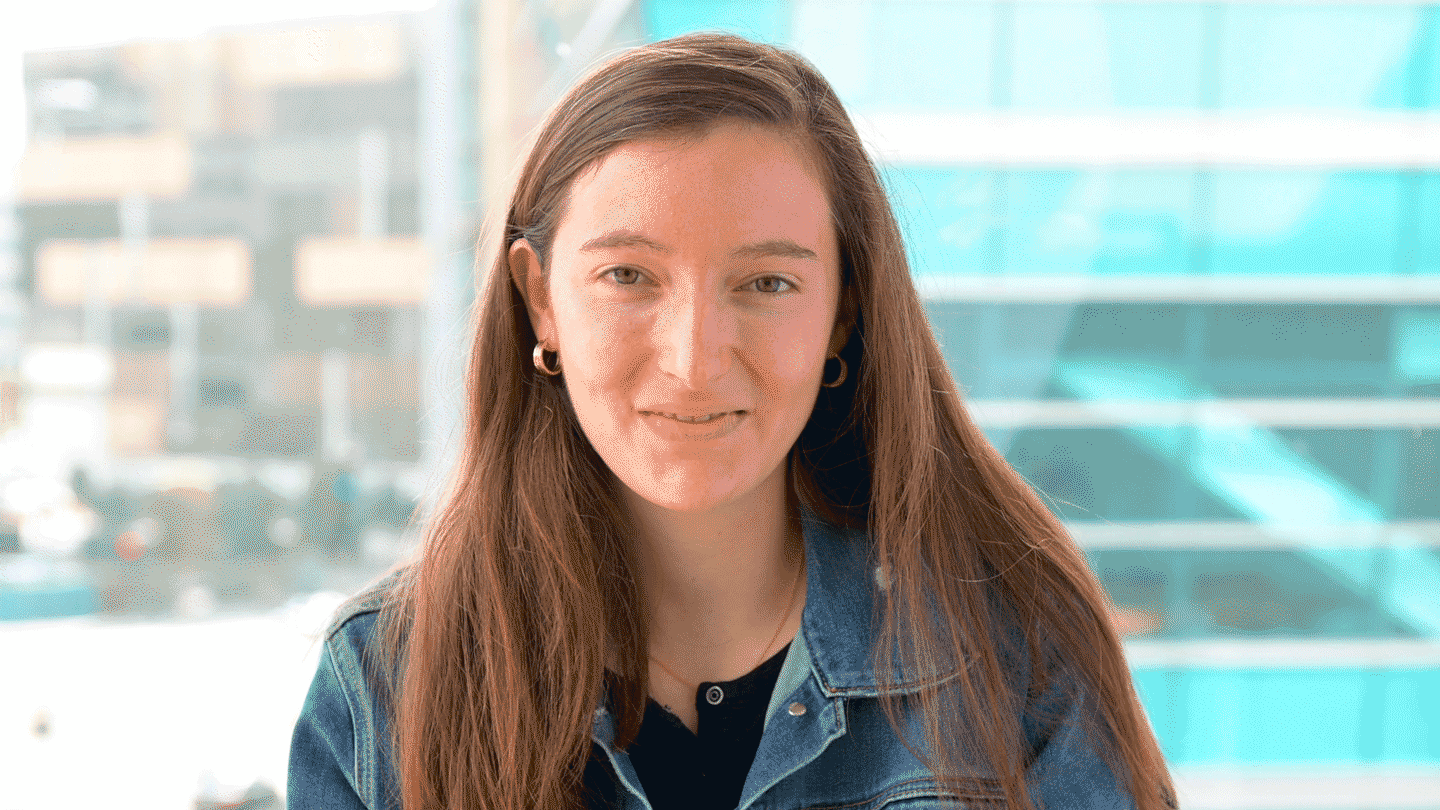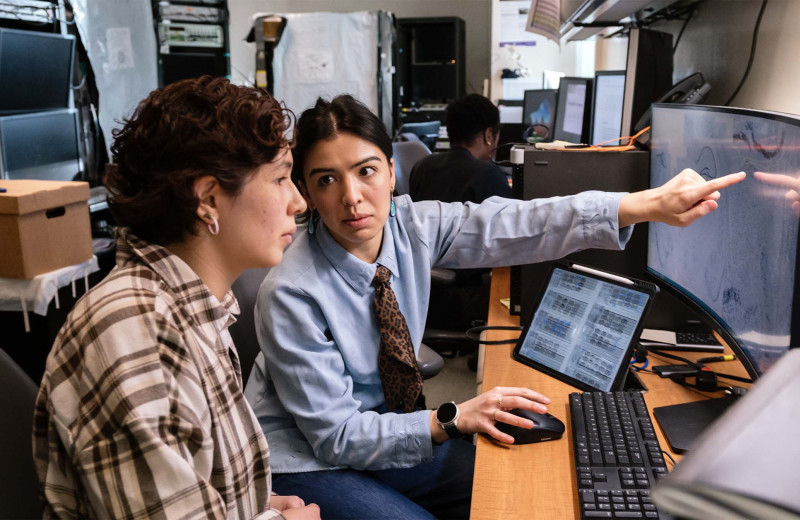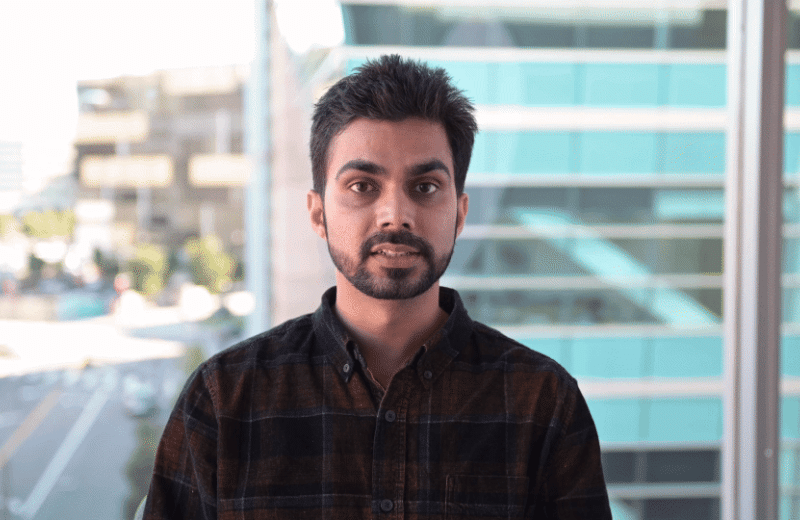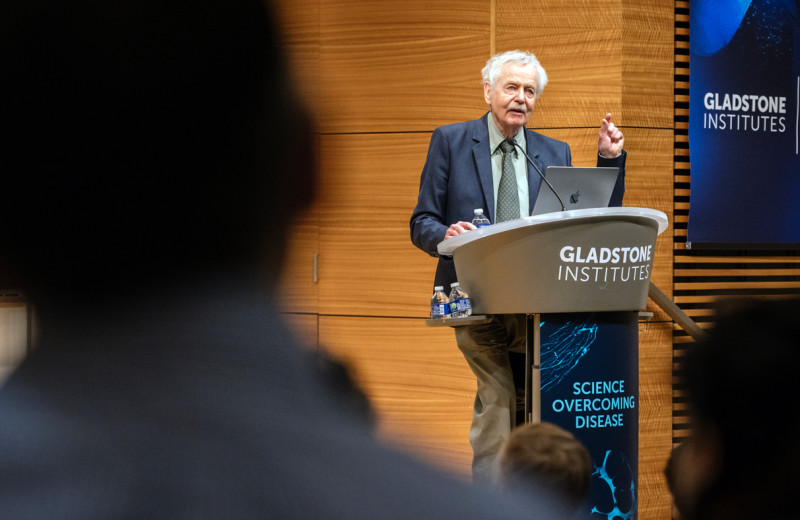Gladstone NOW: The Campaign Join Us on the Journey✕

Christina Buselli, a research associate, describes her work in the Finkbeiner lab, her path to science, and the questions she wishes she could ask her grandfather
Christina Buselli (she/her) is a research associate in the lab of Steve Finkbeiner. She’s originally from Boston, Massachusetts, but has spent most of her life in the San Francisco Bay Area. Buselli studied biology, Spanish, and chemistry at the University of Portland in Portland, Oregon.
What brought you to Gladstone?
After finishing my undergraduate degree, I came to Gladstone to advance my basic research skill set while continuing to be involved in a research area that I had a background in.
During my undergraduate years, I participated in a project that tried to verify the suspected causative mutation for a sheep variant of the lysosomal storage disorder GM1-Gangliosidosis (GM1). GM1 is a rare neurodegenerative genetic disorder that involves the accumulation of toxic material in cells because of lysosomal enzyme deficiencies. GM1 can affect both humans and non-human animals including dogs, cats, and sheep. We were interested in learning more about GM1 in a sheep animal model with the hopes that our findings could lead to further insight about human GM1. This experience was my first exposure to studying lysosomes and lipids and their role in neurodegeneration, and I wanted to continue learning about this after college.
Serendipitously, I was able to join the Finkbeiner lab, where I am part of a team that focuses on a different neurodegenerative disorder called PGRN-deficient frontotemporal dementia, which also involves studying lysosomes.
What do you like about Gladstone?
I really admire the humility and perseverance of my coworkers. I think Gladstone is a place where it’s okay to learn from mistakes and where compassion for others drives hard work, even if no one is watching.
I also appreciate the opportunity to learn from people with all different skill levels and backgrounds at Gladstone. I’ve enjoyed learning new lab techniques and more about data science from the biologists, the other research associates, and the software engineers in the Finkbeiner lab.
Were you interested in science as a child?
Yes. The first thing that comes to mind is participating in science fairs from elementary school through high school, both as a student and a mentor. When I was in high school I had the chance to work with elementary students to design their own projects and understand the scientific method. Something I really like about science is that it's a discipline where we can be lifelong learners but also evolve into more teaching roles over time.
Also, and this is a little more arbitrary, but for some reason I really enjoyed doing Punnett square problems in school. And I think this piqued my interest in learning more about genetics in the future.
Can you describe your current research project?
I’m a part of a team that studies an early-onset form of dementia called frontotemporal dementia, which is often referred to as FTD. When people see the word dementia, they tend to associate it primarily with memory loss, but FTD also involves progressive changes to behavior, personality, movement, and language.
My team focuses on the role that a protein called progranulin plays in this disorder. Progranulin is produced by immune cells (microglia, astrocytes) and neurons, and its levels are decreased in people with FTD. We’re particularly interested in evaluating how this decrease in progranulin impacts lysosomes, which are sort of the garbage disposals of cells, helping to break down macromolecules that could otherwise accumulate and become toxic. We are also taking it one step further and are looking into how this decrease in progranulin affects the levels of other proteins, which may provide mechanistic insight into the biology of the disease.
To investigate this, we grow different types of brain cells (neurons, microglia, and astrocytes) in dishes and stain the cells with markers for all sorts of different proteins. We then image the cells with a microscope and try to look for and quantitate how decreased progranulin changes the cells.
What or who influenced your decision to work in science?
I actually took a pause from science for a while in college, but I eventually found my way back to it thanks to my research mentors at the University of Portland. I owe it to them and all the student researchers I worked with who showed me what a career in science could look like: one where it's okay to learn and make mistakes and where collaboration can triumph over competition.
What do you do when you are not working?
When I’m not working, I enjoy playing the piano, running, making breakfast for dinner, and reading books about bioethics.
I’m currently working on a manuscript with a few of my undergraduate mentors about the ethical implications of gene editing technology. We evaluated college student opinions about using gene editing for different purposes (such as treating somatic genetic disorders, germline genome editing, altering non-human species for reducing zoonotic disease spread, etc.).
If you could learn to do anything, what would it be?
I would love to get better at fly-fishing.
What is your hidden talent?
This is more of a hidden hobby than a talent, but I like playing backgammon.
If you could meet any scientist from any point in time, who would it be and why?
If I could meet a scientist from any point in time, I would love to have the chance to meet my grandfather. He was a chemist who studied plastics in the 1940s and 50s.
He witnessed the evolution of the plastics industry, and I would be curious to hear his thoughts about the environmental and public health risks associated with this work and whether they were concerned about these risks at the time. I know he was also interested in plastic decomposition, and I would like to ask him whether he thinks plastics will ever be able to be fully broken down. But above all, I would like to hear more about his path to becoming a scientist and ask him what advice he would give to scientists starting out today.
Want to Join the Team?
Our people are our most important asset. We offer a wide array of career opportunities both in our administrative offices and in our labs.
Explore CareersVoices of Outstanding Mentorship
Voices of Outstanding Mentorship
Three recipients of Gladstone’s Outstanding Mentoring Award share their personal approaches to mentorship and reflect how this passion has shaped their own growth as leaders.
Profile Roan Lab Graduate Students and PostdocsMeet Gladstone: Shyam Jinagal
Meet Gladstone: Shyam Jinagal
Shyam Jinagal explores how genetics, aging, and regeneration shape the heart—and how those insights could one day restore heart function after injury.
Graduate Students and Postdocs Profile Cardiovascular Disease Srivastava LabA Sculptor of Modern Regenerative Medicine
A Sculptor of Modern Regenerative Medicine
Among his myriad accomplishments, Rudolf Jaenisch—winner of the 2025 Ogawa-Yamanaka Stem Cell Prize—was the first to demonstrate the potential of induced pluripotent stem cells to treat disease.
Awards Ogawa Stem Cell Prize Profile Regenerative Medicine Stem Cells/iPSCs



